![]()
Sytch Pottery, Burslem
| From | To | Occupier | Comments |
| 1802 | 1822 | J & R Hall | The partners were
the brothers John and Ralph Hall - they had an earthenware business at the Sytch
Pottery in Burslem and the Swan Bank Pottery in Tunstall. The partnership was dissolved in January 1822 - John continued at the Sytch Pottery in Burslem with his sons as J Hall & Sons. Ralph continued in Tunstall as Ralph Hall (& Co) (& Son). |
| 1822 | 1832 | J. Hall & Sons | John Hall was in
partnership with his two sons Joseph and Thomas. They became bankrupt in 1832 (Staffordshire Advertiser 20 Oct 1832, 12 Jan 1833) |
| 1832 | 1843 | Barker, Sutton & Till | In
1833 Wiliam Barker of Snow Hill, Burslem together with James Sutton and
Thomas Till of Liverpool Road, Burslem took over the Sytch Pottery from
John Hall & Sons.
Trading as Barker, Sutton & Till they made general earthenware, lustre ware and figures. In 1842 Sutton withdrew from the business which continued as Barker & Till. |
| 1843 | 1850 | Barker & Till | |
| 1850 | 1928 | Thomas Till & Son (s) | Note: "&
SON" is prior to c.1861 when the style changed to "&
SONS" The sons were Edwin Till and William Thomas Till In November 1890 the partnership between the two sons Edwin and William Thomas was dissolved and William Thomas Till continued on his own. At some William
Thomas Till joined in partnership with a Charles Henry Salt. At some Charles Henry Salt joined in partnership with Arthur Cecil Salt - this partnership was dissolved in March 1914 and Charles Henry continued on his own - again the name "Thomas Till and Sons" was retained. |
As always the dates are approximate
 |
The Sytch
- a small area north west of Burslem town centre. |
map showing the location of the Sytch Pottery
the works were in the hands of the Hall family
from 1802 to 1832
Sytch Pottery
"Of very old foundation. In the nineteenth century, the Sytch Pottery passed successively into the hands of J. & R. Hall (1802-22) and then J. Hall & Sons.
In about 1832, Barker, Sutton & Till took to the works; but at subsequent periods, Mr. Barker and Mr. Sutton withdrew from the partnership.
From 1850, it remained in the hands of Thomas Till, who joined in partnership with his sons and the firm became Thomas Till & Sons. The ware produced was good middle-class earthenware. Besides earthenware of the usual average quality - in which services and innumerable useful articles were made by them - Messrs. Till produced coloured bodies of various kinds (cane, sage, drab and lilac); stoneware of a hard and durable kind for jugs, etc.; jet glazed ware; terra-cotta; enamelled ware; and various coloured lustres. These were principally intended for the home trade.
At the Paris Exhibition of 1855, the firm received a certificate of merit. The mark used was the name of the firm in various forms. Messrs. Thomas Till & Sons (Ltd.) continued to 1928."
From Jewitt's "Ceramic Art of Great Britain"
|
Messrs. BARKER, SUTTON, and TILL's Earthenware Factory, Burslem. John Mayer, aged 9 I am a runner of moulds for Adolphus Hancock ; I come to work at six o'clock and go home at six; sometimes stay till half-past seven or eight. I cannot read; I cannot write; I went to day school before I came to work; I go to Sunday school now; my father was a plate-maker; he is now blind; he has not worked for four years or more; mother takes in washing I've got two brothers and two sisters; my two brothers work, one is a squeezer or presser, the other is a colour maker; my sisters are too young to work ; they go to school and pay each 2½d. a-week; I get for breakfast a bowlfull of stir-pudding, as much as I can eat and bacon and taters for dinner; I go home to both; and take the time allowed me, an hour and a half. I am very tired when I get home, and get my supper and go to bed, 'cause I have to be up early next morning. |
Scriven's Report on Child Labour
in the pottery industry in 1840
interview with John Mayer - age 9 who worked at Barker, Sutton & Til
![]()
click
for more on Scriven's report
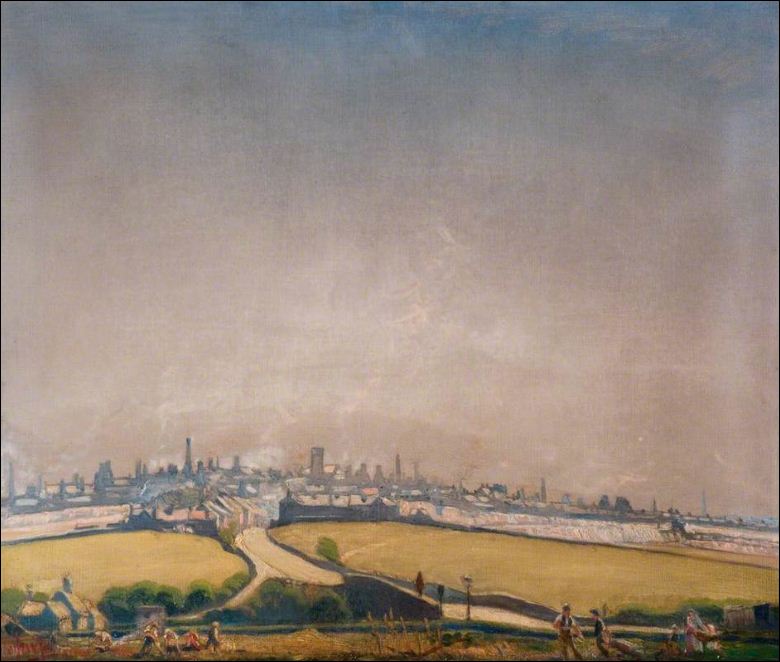
The Sytch, Burslem
Gordon Mitchell Forsyth (1878-1952)
© Gordon Mitchell Forsyth, The Potteries Museum and Art Gallery
The Sytch was the turnpike road
to Church Lawton and then onto the Port of Liverpool
this view is from Brownhills looking up into Burslem - the tower of St. Joseph's
RC church
appears on the horizon, surrounded by thebottle kilns of numerous
potteries.
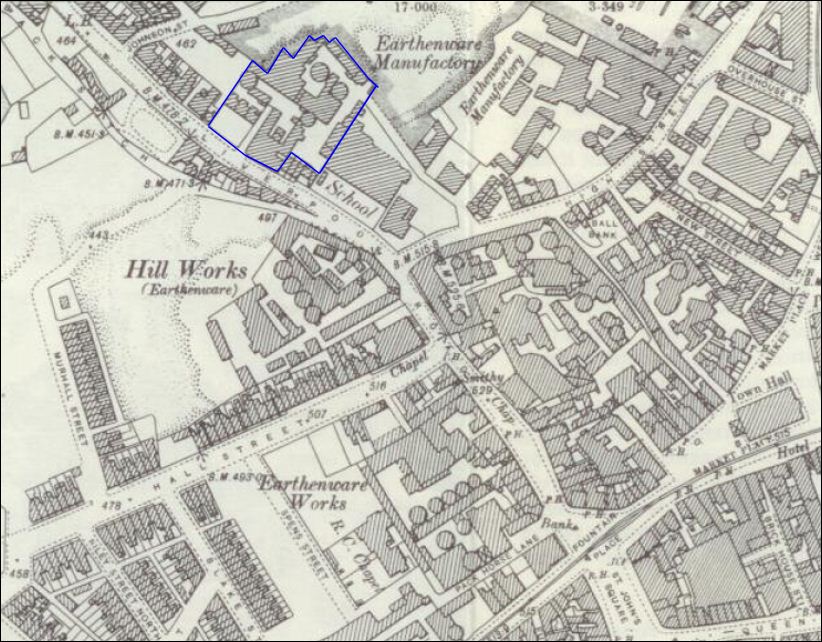
1898 map showing the Sytch
Pottery on Liverpool Road (now called Weston Road) in Burslem,
Stoke-on-Trent

from a 1907
directory showing the section of
Liverpool Road between High Street and
Johnson Street
The London Gazette
February
4, 1831
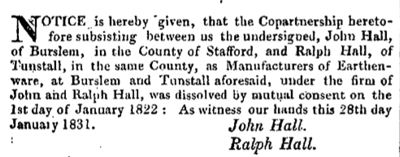
dissolution
of the partnership between John
and Ralph Hall in January 1822
John contined
the business with his sons
The London Gazette
October
4, 1842
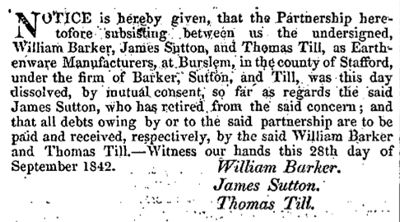
James Sutton
retired from the business
in September 1842
The London Gazette
7th May 1850
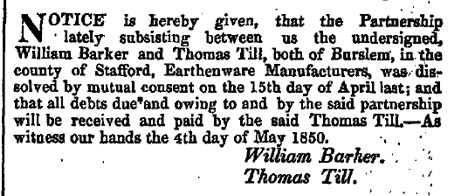
dissolution
of the partnership between Will Barker & Thomas Till
on 15th April 1850
Thomas Hill continued the business
The London Gazette
February
24, 1891
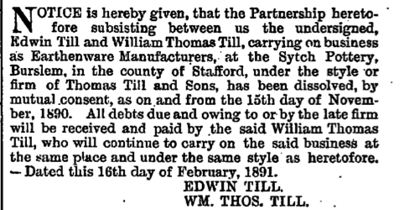
dissolution
of partnership between the two brothers
Edwin and William Thomas Till on 15th November 1890
The London Gazette
June 2,
1903
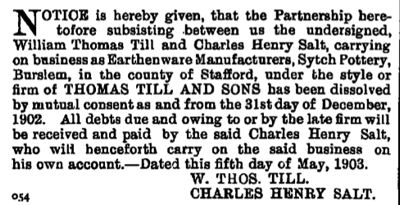
dissolution
of partnership between William Thomas Till
and Charles Henry Salt on 31st December 1902
The London Gazette
10 April,
1914
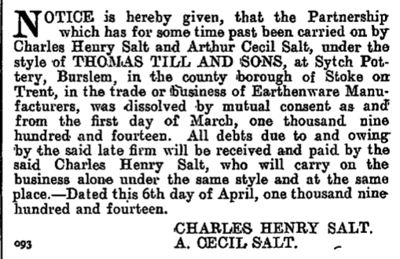
dissolution
of partnership between Charles Henry Salt
and Arthur Cecil Salt on 1st March 1914
 |
The Sytch
- a small area north west of Burslem town centre. |
questions/comments/contributions? email: Steve Birks